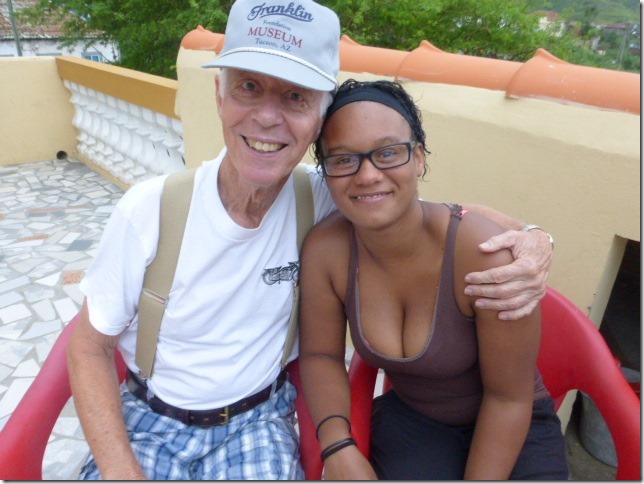The people and culture of Cape Verde
Report #6, my last one
The trip to Cape Verde was quite out of the blue and unexpected. I left while just starting to move onto the houseboat that I rented. Upon my return, I was still sick and now have fully recovered. I am back to doing the moving, fixing, and modifying it to suit my needs. This has taken some time, but I want to summarize my experience with the wonderful native people. I promised this report, and here it is.
Of course, as you can imagine, I trip of just over two weeks is hardly enough time to say that I know much about the place and people. These are just highlights and will be way off base in some respects.
From the capital city, Praia, on the largest island of Santiago, to the backwoods of Brava, we met many of the residents. Some were very well educated, and some were very simple farmers scratching out a bare living.
In Praia, we were warned to be careful at night because some bad people were violent and robbing people. Of course, they were reported to be “outsiders from mainland Africa” and not locals. I don’t know how accurate this was, but we never sensed a single threat from anyone. Cape Verde is one of the most peaceful places that I have ever been to.
The population is black or some mixture, and we never sensed any racial discrimination from anybody at any place or time. The residents are very unusual in that they have a solid work ethic. Lazy didn’t seem to be happening. The integrity of the people was a very high standard. The friendliness was as high as any place that I have visited. The only place that came close was Fiji. The willingness to help us was overwhelming, no matter if we were in Praia or the backcountry.
The only exception was a short visit to a resort that caters to Europeans. That is another way to say “white people” like us. The natives weren’t very friendly at all. I have to assume that they weren’t treated with respect. Hmmm.
In anticipation of finding good people, I packed 50 new uncirculated US one-dollar bills. They have little or no value there but was a souvenir as a thank you. People were surprised, as they expected nothing at any time. I returned with very few dollars.
On the main island, Santiago, we could count the number of people smoking on one hand. We saw a few more on Brava Island. On Santiago, we saw very few children under 2 years old. We might have seen a couple of pregnant women. We have no idea where they are hiding, as the place is full of older children.
At one hotel, we met this very helpful young woman who took me all over town. In one home, I was introduced to the woman who had served as her mother. Her English was quite good. She wanted to know how her son, who is a computer nerd, could get an education in the USA. I explained what I knew of the various factors. Then she wanted to know if I was “available” and I explained that I was very old at 75 years. She didn’t care, as she wanted to marry a mature person.

This is the young mom. She is 15 and has a 1 ½-year-old son in the Boston area where she goes to school. She isn’t with the father, but another man. She was wonderful to me in showing me around and doing the interpreting. She seems to know everyone, and they all love her.
I point this out as an example of something that I found unusual. Nearly everyone seems to be a parent by age 18, or before. Few seem to be taking care of the offspring. Children are everywhere and seem to be well adjusted, happy, and healthy. I am sure that there is far more to this observation, so don’t judge from this.
Another interesting observation about the culture is that when we saw a woman at home, she was likely cleaning or washing. We never saw or smelled a dirty person or a dirty house. These people are clean. I don’t know how they stay so clean, as very little is paved. They have no vacuum cleaners, only brooms, and crude mops.
On Santiago Island, in the country, we saw many shacks. They are what we call squatters, as they don’t own it in any sense that we understand. Nearly all have electricity. It was explained to me that originally, they got electricity by stealing it and burying the wires. That resulted in a lot of deaths by electrocution, so the power company ran safe wires, overhead, to the squatters.
On Brava Island, the land is all surveyed and owned. There are few, if any, squatters.
I have no idea how a country can have several islands that are so different and still operate well. However, it is a third world country, and it shows in many ways. I wish that I had been able to spend a week on each of the other 8 islands.
This visit was before our elections, and I was asked by many just what is going on with our election. I was embarrassed and wasn’t able to explain it, as I didn’t understand it either. On the other hand, the Verdeans are very happy with their president and the political system in general.
The population is about ½ million people, and that more citizens than that live abroad, many in the USA.
Cape Verde has no welfare system. If you don’t work, you don’t eat. It is a free-market society. The poorest person is proud of what they have and how they earn a bare living. The result is that the Verdeans have such wonderful personal characteristics that they do very well when they immigrate to the USA and other places for work. Is there something that we could learn from this lack of welfare?
If I could speak Portuguese, and they had a Kaiser medical facility, I could happily live out my life there. While Portuguese is the official language, the street language is called Creole, a mixture of African languages with additions from several European languages. I couldn’t understand anything.
Yes, I fell in love with the people of Cape Verde.
Keep in mind that this report is a snapshot of two weeks of observations. On the other hand, I have traveled all over the world, and this place is special. I have a feeling that I am not done with the Cape Verde people just yet.
Updated 16 Nov. 2019
